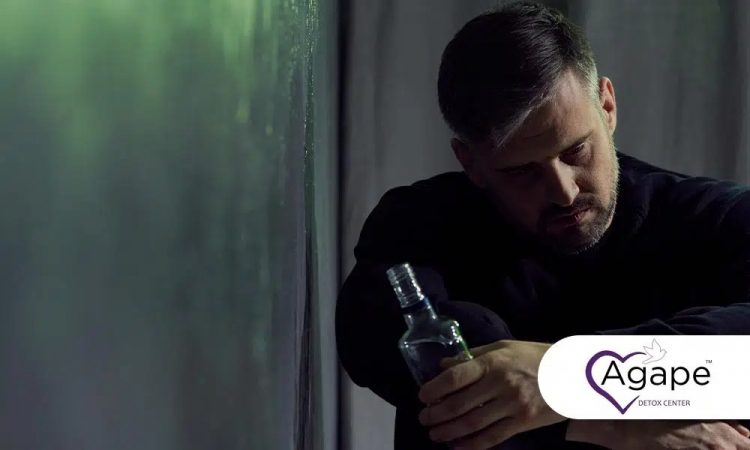Home » Alcoholism » Alcohol Blackouts
Alcohol Blackouts
Table of Contents
ToggleThe Truth About Alcoholic Blackouts
The truth about alcoholic blackouts is that you may be temporarily impaired. Engaging in risky behaviors is probable while your memory doesn’t store the time period. An alcoholic blackout is distinguished by a feeling of lost time. Typically brought on by heavy drinking, alcohol induced blackouts also increase the risk of injury and other harms. Agape Detox Center can help you if you’re struggling with alcohol use in our Florida rehab.
Interrupted Memories: Alcohol-Induced Blackouts
High quantities of alcohol in your body might cause blackouts. When intoxicated, alcohol hinders your capacity to create new memories. It leaves behind memories created prior to intoxication.
The speed and duration of memory loss will increase when your blood alcohol level rises as a result of increased alcohol consumption. Each person experiences memory loss to a different degree. A blackout may also continue even if you stop drinking for while blacked out.
You may go through the following at this time:
- Having trouble walking
- Having trouble talking
- Having trouble standing
- Distorted judgment
- Distorted vision
- Short-term memory loss
Your blood alcohol content may be impacted by a number of variables, including:
- Weight
- Gender
- What kind of alcohol was ingested
- The speed at which alcohol is consumed
It’s important to remember that there is no certain amount of alcohol that can cause a blackout. Everything depends on how much alcohol you’ve had in each drink and how it makes you feel.

What Are Blackouts?
Deep inside the brain is where you’ll find the hippocampus. It’s essential for memory formation. The hippocampus can not build alcohol tolerance. So when a blackout happens, it cannot produce memories.
Your capacity to move, communicate, respond and recall events is affected by alcohol. Additionally, it reduces inhibition, impairs impulse control, and has an impact on judgment.
Types of Blackouts
There are two defined types of blackouts. They are differentiated by the severity of the memory impairment. A “fragmentary blackout” is the most common type. It is described as having spotty memories for time and events, with portions of memories separated by missing periods of time in between. This type is sometimes referred to as a brownout or a grayout.
An “en bloc” blackout is when someone experiences complete amnesia. This can often span hours at a time. With this type of blackout, it is as if this time never happened. This is because memories can not form, and can not be recovered.
Blacking Out vs. Passing Out
It’s critical to understand the difference between passing out and a blackout. When someone passes out, they have either fallen asleep or become unconscious. Being unconscious also produces a lapse in memory.
However, an inebriated person can conduct themselves normally during a blackout. Because the majority of the brain is alcohol-tolerant, they could appear intelligent. They are still capable of eating, moving around, conversing, having sex, driving, and fighting. Due to their appearance of awakeness, it may be challenging for others to determine whether someone is experiencing a blackout.
Can Blackouts Lead to Complications?
The brain may suffer long-term effects of alcohol consumption. The degree of these consequences varies, from brief memory “slips” to chronic, incapacitating illnesses.
Chronic alcohol use is considered to have negative effects on the frontal brain. This is the area of the brain that regulates cognitive function. The creation and recall of both short-term and long-term memories are also influenced by the frontal lobe.
Regular injury to the frontal lobe can affect your personality and conduct, as well as how you carry out activities and retain knowledge. This type of damage can be shown by early signs of dementia.
Even a single blackout can be hazardous. Alcohol slows down brain impulses that regulate the gag reflex and other autonomic reflexes, according to the National Institute on Alcohol Abuse and Alcoholism.
Due to the loss of reflex control, a person who has passed out or overdosed on alcohol may vomit while dozing off. They could suffocate and choke on their own vomit as a result of this. Additionally, a blackout increases your risk of suffering injuries from accidents like falls or automobile crashes.
Ready to get started?
Give us a call today. Our admissions coordinators will answer any questions you may have about our program and walk you through the admissions process.
Get help for Alcoholism Today
Getting help for an alcohol use disorder can be a difficult decision to make. Because alcohol consumption is normalized in our society, we know it can be hard to determine if you or someone you love is experiencing an addiction to alcohol, an alcohol use disorder, binge drinking, or just casually drinking. But, if you or someone you love are the type of drinker who regularly experiences blackouts and would like that to change, please Contact us at Agape Detox today.
- November 25, 2022
- Updated Date: February 29, 2024
Related services
Have any questions?

Stephanie Robilio, LCSW( Medical Reviewer )
Stephanie Robilio is an accomplished Clinical Director at Agape Behavioral Healthcare. With a Master of Social Work degree, LCSW license, and extensive training in Rapid Resolution Therapy under her belt, she brings a wealth of expertise to her role. Her unique combination of education and experience allows her to provide exceptional care to clients and lead her team with confidence. Stephanie’s joy comes from witnessing the moments when her patients creatively connect the dots and bravely move toward reclaiming their power. Her purpose is to help individuals understand their past so they can create a future full of hope, growth, and success. Stephanie attributes a large portion of her success to the supportive culture and strong sense of community fostered by the Agape team.



